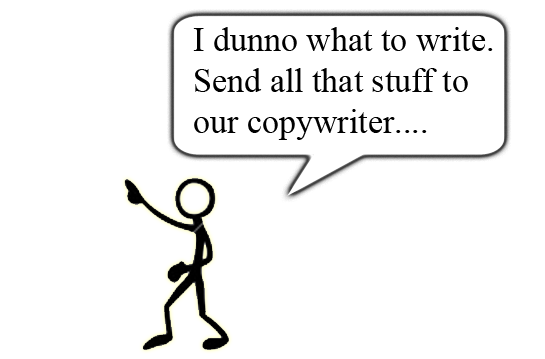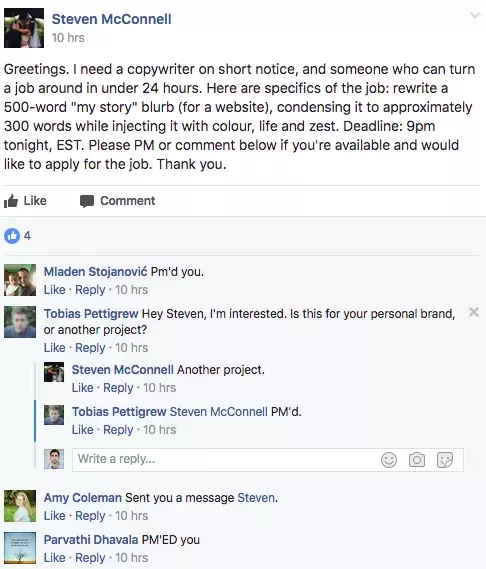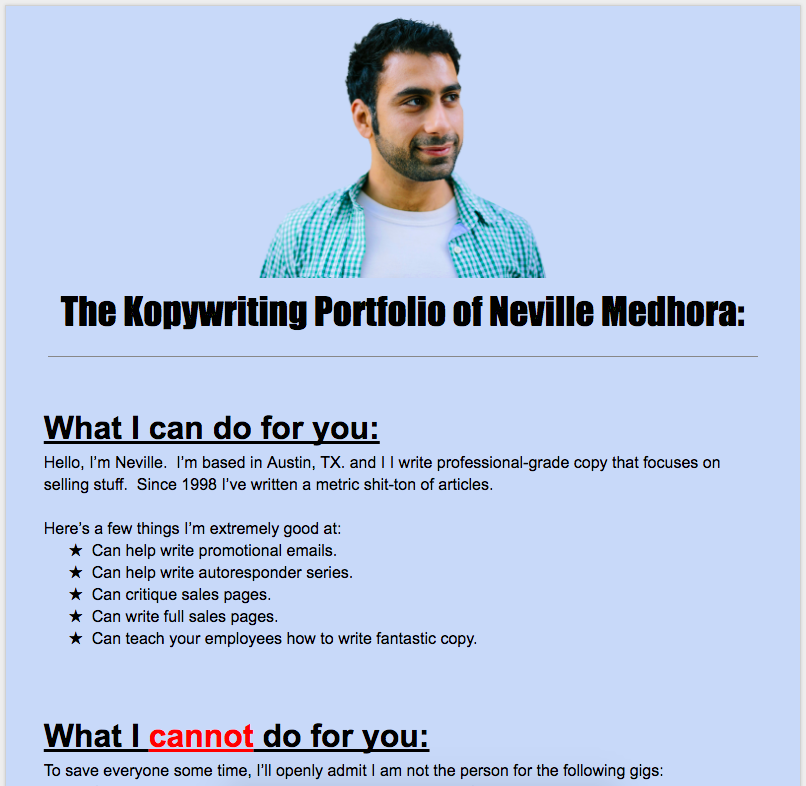How to become a successful Copy Writer
How to become a successful Copy Writer
1. Know the landscape
Over the past decade there has been a surge in online content, creating an unprecedented demand for copywriters. This is largely driven by the need for search engine optimisation (SEO). Well-written copy on company websites not only gives potential customers confidence to buy services, it also helps businesses attract browsers to their website in the first place because it ensures the website places higher in Google's search ranking.
Internet marketing is a fast-moving sector and writers who understand the latest trends in SEO, social media and other forms of digital marketing will have an edge. Check out sites like Moz.com, EConsultancy.com and Copyblogger.com for insight into how content creation fits into online marketing.
2. Find out what type of copywriter you want to be
Before Google, being a copywriter meant scripting TV commercials in an ad agency, writing direct mail campaigns, press releases, brochures or other business literature. Those jobs still exist, but there is far greater demand for web editors, SEO copywriters, content managers and other online content roles. Make sure you understand what's involved in the role you are applying for and upskill accordingly.
3. Have realistic expectations
Mad Men it ain't. You're far more likely to have to produce large amounts of content quickly, accurately and probably for low pay, particularly at the beginning of your career.
Working for a content mill or through recruitment sites, such as Elance.com, can be a good way to build up a portfolio, especially if you've never had work published online before. Your own blog can also be a good way of showcasing your skills.
4. Research the company (and person) you're applying to
The vast majority of speculative applications I receive are addressed "Dear Sir" or "To Whom It May Concern". But on our website it's easy to find my name and what I do. You can also try Linkedin, Google or Twitter – or pick up the phone and ask. Establishing a personal connection with the decision maker at the company you want to work for is a quick win, yet few applicants do it.
5. Use social media to build up a relationship
At the very least, follow the company you want to work for on Twitter, Linkedin and Facebook. If you can build a relationship with an individual through social media then even better, but don't cross the fine line separating enthusiasm from hassling. Twitter is also a great place to find new copywriter vacancies.
6. Don't oversell yourself
Advertisement
On Kitchen Nightmares one of the first things Gordon Ramsay does is cut back the size of the menu. He knows that no chef can do hundreds of dishes well.
When I see a candidate who is offering themselves as a copywriter, marketer, social media guru, Google expert and telesales wizard, but they're applying straight from university, I assume that they are unlikely to be expert in any of those things. Focus your CV on the skills and experience that the employer is looking for.
7. Don't make spelling or grammar mistakes
If you're applying for a job as copywriter, make sure you've checked your application for typos and basic grammar. Read it aloud and then get someone else to read it through before you send it. You can find grammar rules for CVs here.
8. Be prepared to write a test piece
We often ask candidates to create a sample piece of work to demonstrate their skills. For us, speed and reliability are as important as writing talent. And we see the test piece as a good way to assess their commitment and ability to respond to deadlines. So don't get huffy if a company asks you to write something for free – it's standard practice, within reason of course.
9. Specialise
There are lots of copywriters who want to write about "fun stuff" like music, film, fashion, travel and food. There are far fewer writers with expertise and experience in industries like insurance, finance, telecoms and law. By specialising in these industries you can open up more opportunities for yourself.
10. Don't give up
I get so many CVs from new copywriters that my standard response is to say that we currently have no vacancies. But remember, it's not a one-shot deal. While you might not get the job first time round, you might be the right candidate in the future. Those who follow-up don't go unnoticed.
How To Become A Copywriter (without any experience at all)
*In the comments I will answer any questions you may have about getting started as a copywriter.


SO, you wanna learn how to become a copywriter eh? Well it’s very possible. In fact, there’s really no formal education you need. Some of the top-paid copywriters in the world never went to college or took a writing class!
No education!
No formal training!!
Sounds great already!
…..now before you start getting crazy, let’s go through the steps of going from nothing, to freelance copywriter:
STEP 1.) You gotta know WHAT copywriting is at the core:
Copywriting is essentially moving words around to sell better.
Let’s say I work for a company that has a webpage which gets 1 out of 500 visitors to buy something.
If I was a copywriter, I would figure out how to make 1 out of 100 of those people buy. This means 5x more sales from the SAME webpage!
A good copywriter will understand how to do this with their words, and also how to re-arrange pictures and buttons to get more sales.
A good copywriter is not just a writer. They are a keen studier of the human psychology behind purchase decisions!
STEP 2.) Understand WHY people hire copywriters:
Think of the huge amount of content a lot of companies have to put out.
A single insurance company will have to put out all this stuff:
- Ads on TV
- Ads on the internet
- Ads on radio
- Brochures for B2C sales
- Brochures for B2B sales
- Brochures for every different product
- Forms to fill out
- Forms to fill out for various different product lines
- Google ads
- Facebook ads
- Update their Twitter
- Update their Facebook page
- Make content for their website
- Make the content for their website about each different product
- Make sure their content is converting
- Make sure customers understand how to signup
- Send customers packets explaining their policy
- Have scripts for their sales people to follow
- Have scripts for their customer support people to follow
- Write press releases
- The list goes on and on and on and on…


Allllll of these things need to get written by or looked over by a copywriter. And that’s just a single example!
Some companies will rely heavily on copywriters. Some companies (like 37Signals) require ALL members of the team to be great writers before they ever start.
So people will pay a copywriter good money to handle these things for them. But YOU my young friend, need to understand that to get that money, you need to keep relationships within those companies that need those services.
Step 3.) Learning to Get Clients As a Freelance Copywriter:
This is by far the biggest question I get. And people seem to forget one thing:
Establishing yourself as a freelance copywriter is the same as building a business from the ground up.
You’ve got to put in LOTS of effort in the beginning, show talent, and not expect immediate riches. There’s no free lunches here boys and girls.
A lot of people get entranced by the prospect of working from their laptop from anywhere in the world as copywriter. In fact people go nuts when I post pictures like this from various locations!


Since all my copywriting business is conducted from a laptop, I can take off and go work from the beach.
Or if I wanted to drum up an extra $10,000 really quick …..I can just devote some of my hours to copywriting gigs.
But these luxuries are the result of hard work, actual results, and existing exposure.
This won’t happen overnight for most copywriters. And probably NEVER will for a lot of them.
However I’ll share some of the ways I’ve personally seen people get amazing (and high paid) copywriting gigs (5 tips):
Getting Clients #1.) Becoming popular for doing something OTHER than copywriting
If you become known as a famous figure in any field, you have a better chance of gaining credibility.
And if you have high credibility, you can ask for more money.
So how did I build credibility for my copywriting career?
I originally ran a couple of businesses starting from high school, and I first applied some copywriting techniques to the email list I had.
I was involved in a whole bunch of companies:
— NevBlog
— HouseOfRave
— AppSumo
— Sumo
— HustleCon
— TheHustle
…..and I’d done work with a bunch of other companies by this point too, which eventually led me to start https://CopywritingCourse.com.
I always thought my buddy noah kagan would be a great copywriter because of his vast business experience. No matter how he writes, it’s always interesting because he’s been-there-done-that.
Doing things OUTSIDE of the marketing and copywriting field gave me great credibility, because I knew what I was doing more than copywriters who’ve only just done…..copywriting.
Getting Clients #2.) Becoming popular in a specific niche
So a lot of lower-end copywriters will insist “I can write everything!” But in reality they should niche down when they start. For example, if you worked for a big health company and did a lot of writing for them, you should call yourself a copywriter that specializes in the health space.
This will make it easier to gain credibility in a specific area.
You probably wouldn’t super-trust the guy who mows your lawn for financial advice…..however you REALLY might take his advice on how to hedge bushes and get a clean line on the edge of a lawn.
He has very specific advice, and lots of experience practicing what he’s talking about.
Instead of being “just a copywriter” ….it would be better if you were “A female copywriter who specializes in talking to 1st time expecting mothers.”
It would be best to hang out and network in places where people are selling stuff to 1st time expectant mothers. If someone need a copywriter, and you have experience in EXACTLY their niche…..guess who has a high chance of getting the gig??
My personal niche started out with smaller companies and daily deals. Then moved into medium sized businesses.
However if someone approached me to write for 1st time expectant mothers, I could DO It……but I don’t have experience and can’t exactly relate to the struggles of that demographic. So I try to stick to my area of expertise so I can deliver the maximum results.
Getting Clients #3.) Becoming popular for big companies
THIS method can apply to certain people, and be quite lucrative.
Let’s say you worked for a big company in the marketing department and you were exposed to how a big marketing department tests & releases products.
If you were to build a nice little network in the same industry, and then become a consultant with a VERY SPECIFIC expertise, then you get some other big companies to fork over A LOT of money.
Smaller freelance gigs can pay a few hundred dollars. But a huge corporation who is a doing an 8+ month rollout of $100,000,000+ product will pay you some phat-ass cash to ensure they do it right.
Now I personally probably couldn’t get one of these gigs because I’ve never worked inside a huge company. That means I lose major credibility because I’ve never walked the walk.
But if you do have some very niche experience within a big corporation and had a few big wins, you might be able to become a very highly-sought-after consultant.
The cool part is you only need a few good contacts for this.
I know someone who wrote an oil-management program in the 70’s that’s still used today. Till this day he gets sweet-ass gigs from multiple companies JUST to be around if anyone needs help implementing it.
Since the projects he consults for are $2billion+ …..the companies don’t mind shelling out major cash just to keep him around.
Boring? Yes :-(
Sweet cash flow? Yes :-)
This is one of the benefits of working with a big company:
You know how to implement projects within a large company. That is actually a rare skill.
Getting Clients #4.) Get small-time gigs.
Now there are some other ways to get copywriting gigs, but I’ve never seen anyone who consistently made big money doing these things alone, so I’ll just list them quickly:
- Posting on Fiverr for copywriting gigs.
You’ll definitely get some leads this way, but your clients will usually be bargain-hunters and not HUGE jobs. - Posting on Craigslist as a copywriter for hire.
This will generally result in corporate copywriter jobs that are relatively low-paying ($35,000 — $45,000). - Posting on UpWork as a copywriter for hire.
This will get you small to medium gigs. It’s not my favorite way of getting business, but it can get the ball rolling.
The next step is my favorite:
Getting Clients #5.) Post in Facebook Groups where people can use copywriting services.
I think this one because it’s the easiest and most effective. Just go to groups like The Cult of Copy Job Board that you are offering your services for a one-time low price of $xxxxx and that you’re for hire.
A lot of times people will bite.
People also constantly post gigs there such as:


Not all the gigs will be good, but some will.
In the beginning you will have to scrape together gigs, but if you start putting all your work inside a simple portfolio, you can gain some steam. Which brings me to our last step in becoming a copywriter:
Step #4.) Make a Simple Copywriting Portfolio!
Ok, listen to me carefully young buck:
You DO NOT NEED a fancy website. In fact, I’ve never never ever seen someone get a copywriting gig directly from their portfolio. EVER!!
The reason is: people are looking to hire you based on your skills at copywriting. Not “how fancy your website looks.” This is a common mistake.
Look how crappy my copywriting consults page is. That page generates huge returns even though it sucks super bad. The desire to buy is created from previous exposure to me, NOT the way the page looks.
People will spend months and lots of money and time on a fancy website, only to realize NO ONE IS COMING TO IT. The only people going there are the people they meet directly and tell to go there.
The best type of copywriting portfolio is a simple page with the following elements:
- Your name.
- Your expertise (Social Media? Landing Pages? A/B Testing?).
- A few examples of your work.
- How they can book a session with you.
You can even make it in a free Google Doc like this:


See how simple that is?
It also only leaves them ONE option of what to do next, and that’s to book a session with you.
These sessions should generally be a minimum of $100.
If a client is not willing to pay at least $100 for a consultation session where you point out everything wrong with their page, they are NOT going to buy anyways.
My minimum consultation session is $597 now. And I’ve learned the hard way that if people are not willing to pay it, they are not going to be willing to pay you more (or they just simply can’t afford it).
Oddly enough, the more I charge for each hour session, the more respect and compliance I get from the client! They want to make SURE they get their money out of that session , so they ensure they show up on time and show up prepared.
I would personally avoid doing free sessions. Because what generally happens is:
1.) Everyone gets excited about working together.
2.) You setup a meeting with this “prospective client”.
3.) You prepare for the meeting and draw up a proposal.
4.) You talk with the client and tell them what you’re going to do for them.
5.) They tell you “let’s talk again soon after I run this by my boss.”
6.) You never talk again…..and all that time was wasted.
7.) You become sad and poor :-(
To get people taking you seriously, you need to charge them for your time. If they decide to go for a full contract with you, then you can comp them the hour long session. However if they don’t go with you, at least you still get paid.
Charging people for your time is a sure-fire way to get them to value your services.
Every single successful freelance copywriter I know ALWAYS charges for their time.
Step #5.) Some Copywriting Books for you to read:
I’ve read a helluva lot of copywriting books, and these are the one’s I recommend you read to get off to a great start:
BOOK 1.) Read The Gary Halbert Letters (Free) Start by reading “The Boron Letters”. Make sure you print each chapter out for maximum effect!
Ch 1, 2, 3, 4, 5, 6, 7, 8, 9, 10, 11, 12, 13, 14, 15, 16, 17, 18, 19, 20, 21, 22, 23, 24, 25
You can also buy The Boron Letters directly from Amazon.
BOOK 2.) If you want a book that sits on your desk and can re-cap this kourse quickly, then grab my book called “This Book Will Teach You How To Write Better” from Amazon.
BOOK 3.) Read Advertising Secrets of the Written Word by Joseph Sugarman. This book usually costs in the $30 range, but is one of my go-to books for ideas on how to position copy. Almost every successful copywriter will know this book.
BOOK 4.) Also, check out Ogilvy on Advertising by David Ogilvy (great for traditional advertising advice as well)
Your Next Steps To Becoming A Copywriter:
I showed above in this post some good things to do first:
- Read the copywriting books I recommended above.
- Making a simple copywriting portfolio.
- Put yourself out there.
Here’s how I personally went about becoming a professional copywriter when I had no portfolio and no work experience to my name. These are tips that apply to going after any new job or career path.
1. Know the market inside and out.
People often have very romantic notions about what being a writer is like until they look at the numbers. Sure, you should pursue your passion. You should also know how to feed yourself.
Learn how much writers can make in any given industry, what the asking price is for your skill set and how many rows of teeth the competition has. Also accept that you’re basically entering a red ocean (shark-infested, lots of competitors). There is no blue ocean (calm, few competitors) for any kind of professional writing anymore.
For example, did you know that, for reporters, correspondents and broadcast news analysts, the median salary is $38,870 per year in the United States? Technical writers, on the other hand, make $111,260 per year. But they’re also the writing sector most likely to be automated by machines in the not-so-distant future.
The reason I chose to be a copywriter? It was the most lucrative writing segment ($68,345 on average) that I qualified for. And, I figured I’d like writing copy because I'd always enjoyed good jingles, commercials and ads. I’m a fan of conversational language. It all added up.
2. Believe in yourself.
Some people might laugh at me for including this, but belief is 100 percent necessary for success. For example, many kids are taught from a young age that creative careers are basically financial suicide and that liberal arts majors get no love.
Related: A 6-Step Copywriting Formula That Could Boost Your Sales Big-Time
As a result, even if they have talent and motivation, these kids can't escape the subconscious notion that a career as a professional writer is kind of a boogeyman. These kids embrace the belief that they're destined to fail. They give up before they even try.
Don't do that, yourself: Take stock of your own skill set, passions, interests, time frame and situation. Only you know if you’re in the right place to give this writing thing a shot. And only you know if you have a reasonable chance of success. Remember that you’re entering a red ocean.
For me, going to med school was the safe choice. But I knew I had a few things going for me which helped with my decision. I was basically a straight A English student. So, it wasn’t like I had no shot at being a decent copywriter.
Ultimately, I made an educated guess based on what I knew at the time. Then I took the plunge.
3. Try it out for fun first.
Once you’ve decided, “Yes, I can do this thing,” you actually need to find work. If you already have a portfolio, great. If not, the easiest way to get your feet wet is to assign yourself a mock project as if it were from a client.
For example, if you want to be a copywriter, go to the nearest corner store, grab of bag of chips and read the copy on the back. Then make it better.
Or find an easy assignment you can do for free. If you have a friend or family member who needs help with a slogan, email or website, help him out. Look for unpaid internship opportunities. Take work for pennies on the dollar. The point isn’t to make money yet -- it’s to see if you like the work.
Did I have to learn, follow and internalize copywriting rules I knew nothing about? Absolutely. But I enjoyed the journey, and that was a huge leading indicator of my potential longevity in the business.
4. Prepare to fail and get rejected a lot.
There are a few important milestones in the life of a professional copywriter. One of the biggest is when you earn your first sale. Your confidence shoots through the roof. You feel like Hemingway.
Then you quickly realize that even if you like writing and think you’re good at it, others may not agree. It’s one thing to write for free, another to write for money and another thing entirely to do it so often and so well that you can turn it into a full-time job.
This is the make-or-break point for all professional dreams. How well do you respond to failure and your biggest fears? Can you live with scars? Or do you expect the world to hand you trophies?
When I decided to become a professional writer, I was terrified. I felt that I was throwing away a perfectly secure, lucrative and respectable future as a doctor to be poor on my own terms. In my desperation, I applied to hundreds of jobs and wrote for friends and family for free. I offered my services to college buddies who'd started their own small businesses.
Here’s what I learned: Humans can become accustomed to anything, including failure. Those first few rejection emails hit me like a sucker punch every single time. But the 50th rejection? I barely noticed. I was too busy applying to new jobs and sending out that week’s proposals.
5. Don’t specialize to start -- play the field.
Scaling a specialist strategy is easier than scaling a generalist strategy. That’s why some copywriters write only for dentists, some only for SaaS companies. But you don’t need to decide on your niche at the start; in fact, you shouldn’t.
Instead, write for as many different clients and industries as possible. Write different types of content. Make sure you understand copy in every part of the digital marketing funnel and buyer journey. Play around with charging different rates and putting together custom packages.
Then pay attention to what clients want most, what they ask for that you don’t offer and what gives you the best ROI in terms of your input (i.e., time and effort) and the client’s output (i.e., fantastic testimonial and recurring revenue).
My agency works mainly for tech, finance and healthcare clients. Things just happened that way and we enjoy those verticals. But we would never have known that if we hadn't opened ourselves up to the market.
6. Learn how to brand and sell yourself.
As you get more clients, you’ll notice that most people don’t care about your writing pedigree or actual writing chops. They base their decision to work with you on: a) whether they like you; and b) if you have good testimonials -- both in-person and online.
That’s why you need to learn to sell yourself. Most writers are awful at this (I certainly was). We think our writing should speak for itself, but that’s not the way the world works. You have to make an argument for why you’re the right long-term partner.
This doesn’t mean you need to become a digital marketer or a master of marketing funnels. But you need to be able to go to networking events or mixers and comfortably mingle with prospective clients. I had no sales experience at all, so I learned how to do sales at a Manhattan BNI chapter.
7. Do you love it enough to do it full time?
Even if your name isn’t on the first piece of writing you sell, you’re still "published" the moment your client puts it out there for all to see. So, go treat yourself! This is what so many aspiring writers around the world work toward for many years. Give yourself a big pat on the back.
Many writers stop here, and that’s totally fine. They keep their full-time jobs and write on the side. But maybe you’re hungrier. Maybe you see yourself living “the writer’s life” and doing this full-time. Maybe you could begin a blog, write a business book or start an agency like I did.
Do you want to become a full-time professional writer? Can you hit the six-figure mark in X years? These are personal questions that only you can answer.
You have to be more afraid of not trying.
I freelanced sporadically and part time in between unemployment stints for years before I found any traction. My self-confidence was like a seesaw. I felt like giving up.
But I didn't quit, because being a professional writer was my childhood dream. It wasn’t a fantasy -- it was my dream. So, when I had to choose between pursuing what I really wanted or assuring myself of a “secure” future, I saw giving up my dream as far worse for me, personally.
Of course, being a professional writer is just one type of dream and journey. Maybe you want to be a professional organizer, startup billionaire or life coach. Whatever your dream, and no matter how different it is from your day job, don’t be ashamed of it.
Comments
Post a Comment